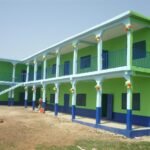How did this come to our attention?
Access to safe water, proper sanitation, and hygiene is a basic human right, yet millions of people, especially in underserved regions, struggle to meet these essential needs. During our outreach programs, we observed the devastating impact of unsafe water and poor sanitation on communities—rising health problems, school dropouts due to waterborne diseases, and challenges faced by women and children in particular.
These alarming realities highlighted the urgent need to address this issue. Recognizing that clean water and sanitation are critical to health, dignity, and development, we made it a priority to provide sustainable solutions to this pressing concern.


Clean water, sanitation, and hygiene education are basic necessities for a healthy environment and a productive life and well life being
4100
Wells bulit
6000+
Lives transformed
497
Communities Helped


Want to donate ?
Not a problem. Call us now
+233 30 222 3518
Or email us :
info@icodehs.org
Donate, partner or volunteer
And your your contributions changing lives and building communities to the level we all desire.





